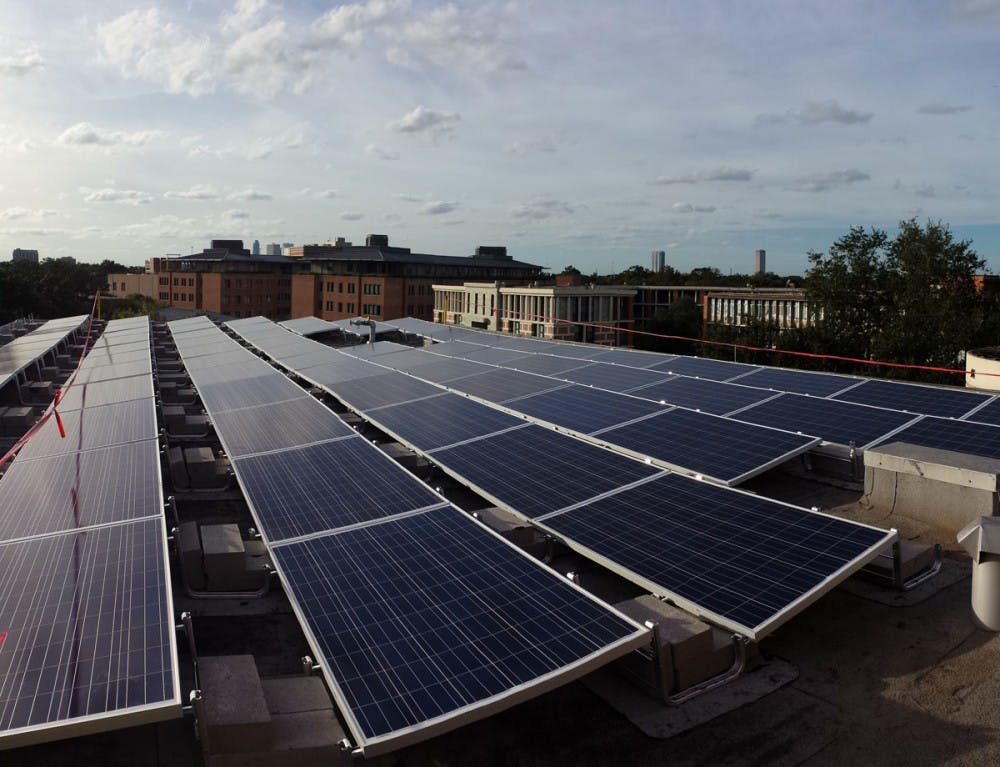Rice outlines plans for climate neutrality by 2038

Installing solar panels on the Jones College rooftop is a part of H&D’s initiatves to make Rice a more environmentally-friendly campus. The current plan outlines climate neutrality by 2038.
Over the past few weeks, passersby in north campus may have noticed the Jones College south wing rooftop is undergoing construction of solar panels to be completed in the coming months. But this project, led by Housing and Dining, is no usual renovation: According to Rice University’s Director of Energy and Sustainability Richard Johnson, it is the first of many initiatives aimed at making Rice a more environmentally-friendly campus.
“We will also be starting soon on an energy efficiency project in the Space Sciences building,” Johnson said. “Our intention is, over the next ten years, to reduce our emissions by 20 percent.”
Last year, a university-led committee of administrators, faculty and staff completed a study called the Rice Integrated Climate and Energy Master Plan. The plan, which includes projects like investing in renewable energy, retrofitting buildings and establishing energy efficiency standards for new construction, provides an outline to make campus climate neutral — in other words, producing zero net emissions — by 2038.
“We’ll still have some emissions, but we’ll have something that counters it,” Johnson said. “And that something is in the form of a 50,000-acre timber plantation in southwest Louisiana — the Rice Land Lumber company, a part of William Marsh Rice’s original endowment. It sequesters carbon, providing an offset for some of our emissions.”
Though the plantation has been around for years, Johnson says this initiative has been made possible only recently due to the development of new, sustainable technologies.
“In 2006, electricity from a photovoltaic panel cost $9 per watt,” Johnson said. “Today, that number is down to $2. That’s an illustration of how significantly change in cost has made projects like this viable.”
The idea of climate neutrality gained traction among universities in 2006 when a group of university presidents initiated the American College and University Presidents Climate Commitment aimed at phasing out greenhouse gas emissions from campuses nationwide. President Leebron signed the pledge in 2007, making Rice one of the now 684 members of the initiative. Johnson said Rice’s participation will yield substantial benefits for the environment as well as the university itself.
“[This] is an excellent learning opportunity for our Rice community, especially for our students,” Johnson said. “To this end, students have played a key role over the last several years in developing the university’s carbon footprint and identifying potential strategies to mitigate our emissions … In fact, one of those projects ended up leading in part to the solar installations at Jones.”
On a larger scale, Johnson said he is confident the climate neutrality plan will have a positive impact on the university’s reputation as a leader in addressing environmental sustainability.
“This particular initiative speaks to our desire to leave a better world for future generations,” Johnson said. “We’re in the energy capital of the world, so it makes a powerful statement for us to take a leadership position.”
Tierra Moore, head of the Student Association Environmental Committee, said she hopes to extend awareness of the climate neutrality initiative to the entire student body.
“In order for things like [the initiative] to be successful, it’s important for the SA environmental committee in particular to host an educational campaign across campus to show students what it truly means to be sustainable,” Moore, a Baker College senior, said. “We have made progress in securing funding for future environmental and climate related student projects. With regards to the SA40K, the senate recommended allotting $22,000 to the Rice Environmental Society. I’m thinking of hosting a meeting with Rice Environmental Society to discuss how we should move forward. I think we should advertise these funds as a platform for us to go forth with this educational campaign and see if we can make it into [Orientation Week].”
Several students have voiced their approval for a campus-wide educational campaign. Camila Kennedy, a native of Austin, Texas, said she was surprised that Houston is not as environmentally conscious as her hometown.
“I arrived here and was shocked that people didn’t seem to be using the recycling bins around campus,” Kennedy, a Jones College sophomore said. “And when I went to the grocery store, I didn’t have to bring my own reusable bag. It’s very different from Austin, which is very progressive about environmental issues. So I would definitely be in favor of an educational campaign.”
More from The Rice Thresher

Dis-O, move-in weekend see increase in alcohol transports from last year
Rice’s first wet weekend of the year saw four times as many calls for intoxication-related transports of students to the hospital compared to the previous three years, according to emails sent out by college presidents and chief justices.

On-campus meal plan changed to unlimited swipes
Housing and Dining recently revealed a new dining plan for the upcoming semester. The required on-campus meal plan now has unlimited meal swipes, compared to 375 meal swipes last year. H&D said the previous on-campus meal plan was for students who intended to eat on campus 15 to 25 meals a week.

Rice Stadium student section relocated
The Rice Stadium student section has been relocated to sections 106 and 107, according to an announcement from Rice Athletics on X.

Please note All comments are eligible for publication by The Rice Thresher.